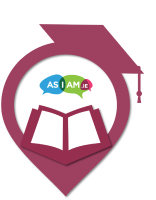
Starting university or college can bring lots of changes and making friends can feel both exciting and overwhelming. Building good friendships takes time, and it’s okay if it doesn’t all come naturally right away. Whether you’re building new friendships or deepening existing ones, here are some helpful ways to maintain strong, healthy friendships while also looking after your own needs.
You don’t have to tell anyone you’re Autistic if you don’t want to, but if you have a close friend that you feel safe with, you might want to share it with them. It’s your decision, and it’s okay to wait until it feels right. Disclosing can be hard because reactions can vary, but it can also help friends understand you better.
For example, if someone doesn’t know you’re Autistic, they might misread your behaviour. They might think you’re being rude if you speak differently or spend a lot of time on one topic, or they might feel hurt if you leave a noisy room without explaining why. But if they understand sensory overload or special interests, your actions will make more sense.
You could also let them know about things like:
These explanations can help friends support you and avoid misunderstandings. If you do decide to tell them, it’s often helpful to say it casually, like it’s just another part of who you are. For example: “Being Autistic, I find bars and clubs overwhelming”
If you’re nervous about how someone will react, try listening to how they talk about Autism or disability. If they seem respectful and open-minded, they’re more likely to respond well. You can also point them to resources like the AsIAm website if they want to learn more.
And remember, you’re not in a workplace or classroom here. If a friend reacts badly, you can choose to stop spending time with that person. You have every right to surround yourself with people who accept and understand you.
In some cases, the person you’re opening up to may also be neurodivergent. Sharing your experience could even create a stronger sense of connection and mutual support.
Friendship should never come at the cost of your own wellbeing. Setting clear boundaries helps avoid burnout, misunderstandings, and conflict.
Let’s say a friend often likes to drop by your accommodation without warning. Even if you enjoy their company, you’re allowed to ask them to message first so you can prepare for their visit. Saying something like “I like seeing you, but I need a heads-up before visits” is totally okay.
The same goes for activities. If a friend invites you somewhere you find stressful, like a nightclub, you can:
Being honest about your limits shows self-respect and helps your friends understand how to include you in a way that feels safe and comfortable.
Autistic people often care deeply about their friendships but it’s important to remember that others have boundaries too, and they may express them differently.
For example, maybe you enjoy long conversations on the phone, but your friend prefers quiet evenings alone. If you call them often and they don’t answer, they may later say something like, “After work I just crash and don’t pick up my phone”, that might be their way of hinting they need space.
Neurotypical people often don’t say “no” directly, so it helps to listen for clues like this. If you’re not sure, it’s okay to ask, gently. You might say something like: “I prefer when people don’t drop by without notice, do you feel the same?” This lets you talk about their preferences without putting pressure on them.
Friendship is a two-way street. If you want your needs to be respected, it’s just as important to respect the needs of your friends. This balance creates mutual understanding and makes friendships last longer.
You deserve friends who value you and allow you to feel safe being yourself. Whether or not you choose to disclose your diagnosis, setting boundaries and respecting your and others’ boundaries is key to building supportive, lasting connections.
